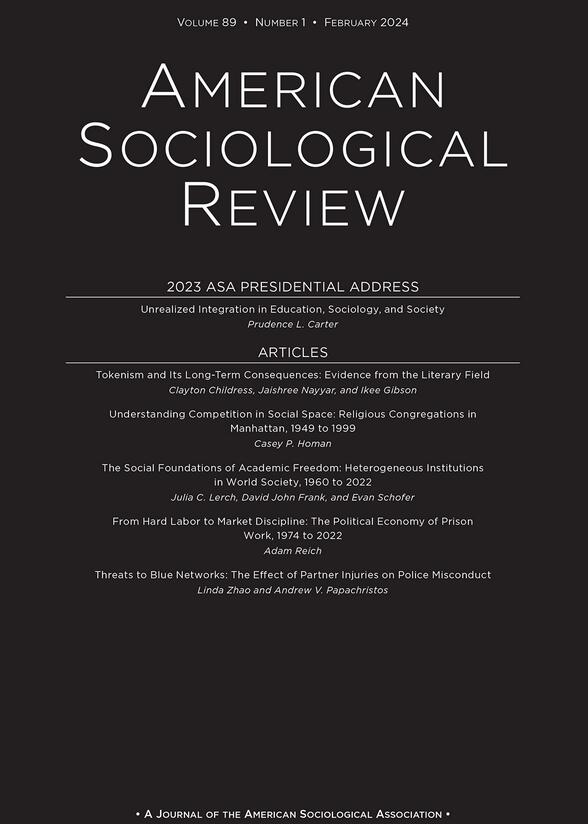The Politics of Police
IF 6.2
1区 社会学
Q1 SOCIOLOGY
引用次数: 0
Abstract
The connection between racially prejudiced policing and politics has a long history in the United States. In the current period, police organizations have displayed unprecedented support for Republican presidential candidates, and both have organized against social movements focused on addressing racial disparities in police contact. Yet despite strong connections between law enforcement and party politics, we know almost nothing about the relationship between partisan identity and the behavior of police officers. Using millions of traffic stop records from the Florida Highway Patrol and linked voter records, the present study shows that White Republican officers exhibit a larger racial disparity than White Democratic officers in their propensity to search motorists whom they have stopped. This result is robust to an array of alternative empirical tests and holds across varying sociodemographic contexts. I also find that both White Republican and White Democratic officers grew more biased between 2012 and 2020, a period characterized by the rise of the Black Lives Matter movement and the election of Donald Trump.警察的政治
在美国,带有种族偏见的警务与政治之间的联系由来已久。在当前时期,警察组织对共和党总统候选人表现出前所未有的支持,并且都组织反对以解决警察接触中的种族差异为重点的社会运动。然而,尽管执法和政党政治之间有着密切的联系,但我们对党派身份和警察行为之间的关系几乎一无所知。利用佛罗里达高速公路巡逻队数以百万计的交通拦截记录和相关的选民记录,目前的研究表明,共和党白人警官比民主党白人警官更倾向于搜查他们拦下的驾车者。这一结果对一系列可供选择的经验检验是稳健的,并在不同的社会人口背景下成立。我还发现,在2012年至2020年期间,共和党和民主党的白人官员都变得更加偏见,这段时期的特点是“黑人的命也是命”(Black Lives Matter)运动兴起,以及唐纳德·特朗普(Donald Trump)当选。
本文章由计算机程序翻译,如有差异,请以英文原文为准。
求助全文
约1分钟内获得全文
求助全文
来源期刊

American Sociological Review
SOCIOLOGY-
CiteScore
13.30
自引率
3.30%
发文量
35
期刊介绍:
The American Sociological Association (ASA) is a non-profit membership association established in 1905. Its mission is to advance sociology as a scientific discipline and profession that serves the public good. ASA is comprised of approximately 12,000 members including faculty members, researchers, practitioners, and students in the field of sociology. Roughly 20% of the members work in government, business, or non-profit organizations.
One of ASA's primary endeavors is the publication and dissemination of important sociological research. To this end, they founded the American Sociological Review (ASR) in 1936. ASR is the flagship journal of the association and publishes original works that are of general interest and contribute to the advancement of sociology. The journal seeks to publish new theoretical developments, research results that enhance our understanding of fundamental social processes, and significant methodological innovations. ASR welcomes submissions from all areas of sociology, placing an emphasis on exceptional quality.
Aside from ASR, ASA also publishes 14 professional journals and magazines. Additionally, they organize an annual meeting that attracts over 6,000 participants. ASA's membership consists of scholars, professionals, and students dedicated to the study and application of sociology in various domains of society.
 求助内容:
求助内容: 应助结果提醒方式:
应助结果提醒方式:


